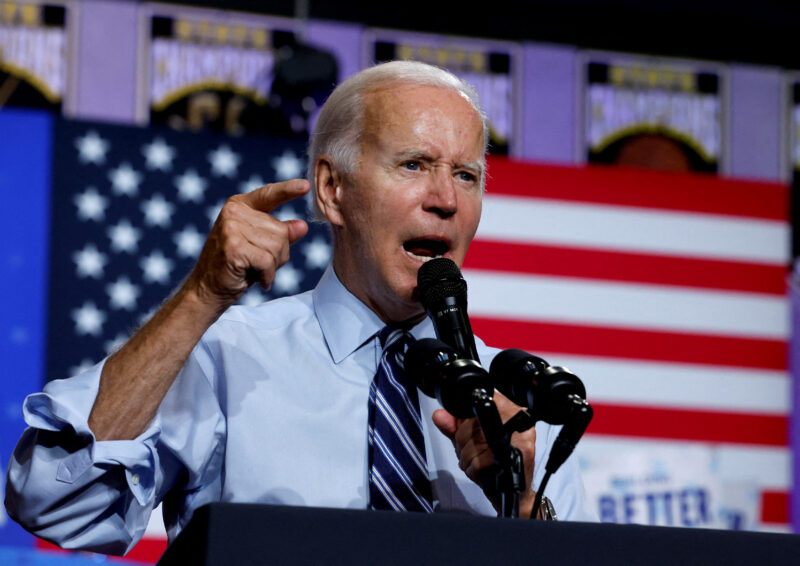U.S. President Joe Biden is traveling to the swing state of Pennsylvania on Thursday to unveil his federal budget plan laden with spending proposals and higher taxes on the wealthy but also forms a blueprint for his expected 2024 re-election bid.
Speaking at a Philadelphia union hall, the Democratic president will highlight plans to cut the nation’s deficit by nearly $3 trillion over 10 years by raising taxes on those earning more than $400,000 a year and ending some corporate tax breaks enacted in 2017 under then President Donald Trump, reviving a key promise from the 2020 presidential campaign.
Overall, the budget will increase federal spending in the 2024 fiscal year to $6.8 trillion from the $6.2 trillion spent in 2022.
“My 2024 Budget is a blue-collar blueprint to rebuild America in a fiscally responsible way that leaves no one behind,” Biden said an introduction accompanying the document.
Biden’s proposal already faces stiff opposition from Republican lawmakers emboldened by winning control of the House of Representatives in November’s midterm elections, and large parts of it are unlikely ever to be enacted.
The plan, however, is a political statement that directly defies Republican House Speaker Kevin McCarthy’s threat to block an increase in the $31.4 trillion limit on federal borrowing unless Biden agrees to rein in federal spending.
Biden proposes funding higher spending and narrowing the deficit by imposing a 25% minimum tax on billionaires and doubling the capital gains tax from 20%, the White House said.
He also wants to quadruple a 1% stock buyback tax, picking a fight with many of the investors he would need to call on to finance any re-election campaign.
Political messaging aside, the Biden budget makes clear one thing – the aging U.S. population means that legally mandated spending on social programs will continue to be a long-term drag.
The budget projects a growing national debt and more than $1 trillion deficits every year over the next 10 years, even if Biden gets his requests for higher taxes and cost-cutting measures.
For the upcoming fiscal year, the administration projects 1.5% economic growth, unemployment at 4.6% and 2.4% consumer price inflation.
REPUBLICAN PUSHBACK
“President Joe Biden’s budget is a reckless proposal doubling down on the same Far Left spending policies that have led to record inflation and our current debt crisis,” McCarthy and other Republicans said in a statement. The budget contains “trillions in new taxes that families will pay directly or through higher costs,” they said.
John Gimigliano, a senior tax executive at KPMG accounting firm, said Biden’s proposals had “little-to-no shot” at becoming law, they served an important political purposes.
“While the tax proposals that will be put forth by the administration later today are unlikely to get much traction in a divided Congress, it is the job of the president to reinforce the current administration’s view of the tax system for the American people and to keep these ideas alive in their minds as we head into the 2024 elections,” he said in a statement.
Republicans say Biden’s spending during his first two years in office drove inflation to nearly 40-year highs last summer. The Federal Reserve estimates COVID-related federal spending under Trump and Biden in 2020 and 2021 added 2.5 percentage points to U.S. inflation.
Republicans are already readying $150 billion in cuts to non-defense discretionary programs, including about $25 billion from the Department Education and cuts in foreign aid and programs aimed at preventing sexually transmitted diseases. They say that would save $1.5 trillion over a decade.
Is there common ground? “Very little, very little,” Republican Representative Ben Cline told Reuters. “He doesn’t want to cut any spending, he just wants to raise taxes.”
SPENDING ON CHILDCARE, BORDER
Biden’s budget revives the idea of federal relief to working families by investing billions to ease the cost of childcare and ensure free preschool for all of the country’s 4 million 4-year-olds, and promises to increase rail safety.
White House officials say lowering the cost of childcare will boost the economy and allow more women to return to work. Such proposals also enjoy strong support and could help boost Biden’s low approval ratings as he gears up announce his reelection bid this spring.
It also includes an additional $800 million over 2022’s enacted budget for border and immigration services, a nod to Republicans’ call for more enforcement on the country’s southern border.
(Reporting by Andrea Shalal and Trevor Hunnicutt; Aadditional reporting by David Morgan; Editing by Robert Birsel, Heather Timmons and Alistair Bell)

